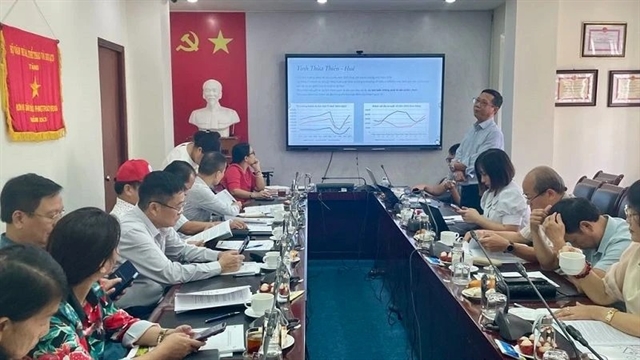Experts from various localities have united to tackle the seasonal challenges in the northern central coastal region, which faces issues due to its non-specialised tourism product system and climate factors, despite its rich natural resources.

Xuân Thành Beach in Nghi Xuân District, Nghệ An PRovince has long been a famous tourist destination in hot summer days. VNA/VNS Photos
HÀ NỘI — Experts from various localities have united to tackle the seasonal challenges in the North Central coastal region, which faces issues due to its non-specialised tourism product system and climate factors, despite its rich natural resources.
These challenges for localities to develop year-round tourism were discussed at a workshop called "Developing tourism products to overcome seasonality in the North Central coastal region" held recently in Hà Nội by the Institute for Tourism Development Research (ITDR) and which drew the attention of many experts, researchers and journalists.
Most tourist destinations in the world are affected by seasonality. Destinations with high fluctuations in seasonality often face various challenges, such as overcrowding, high prices and inadequate infrastructure in peak seasons, as well as a lack of services and job opportunities in shoulder and off seasons.
Seasonality is a measurable feature with significant economic and social impacts.
“Seasonality brings a high concentration of tourists in a certain period of time, causing traffic jams at destinations, reducing the convenience of travel and accommodation, lowering service quality and creating environmental pressure on tourism resources," said M.A Hoàng Đạo Bảo Cầm of the ITDR.
Home to nine UNESCO world heritage sites, including cultural, natural, tangible and intangible heritage, the North Central region holds an important position in national tourism.
Currently, the region's highway infrastructure is gradually being completed, and the air, rail and sea routes are increasingly improving, facilitating travel. These hold promise for the North Central region to become a favourite destination in the near future.
Cầm, however, said seasonality in tourism is a clear factor in the North Central region. Despite the progress of tourism development, tourism businesses are still not meeting their potential. The current major services are still mainly seasonal, are still small and fragmented, lack close connections between localities and do not have the necessary connection between destinations, reducing the region's attractiveness for tourists.
Popular types of tourism in the region include beach tourism, cultural and heritage tourism, eco-tourism, festival and religious tourism, medical and wellness and adventure tourism. But most are affected by seasonality.

Experts take part in the "Developing tourism products to overcome seasonality in the North Central coastal region" workshop.
According to Cầm, overcoming seasonality is a key task for developing sustainable tourism as well as the region's socio-economic development. Localities needed to build a variety of products along with diversifying the domestic tourist market. They should develop the international tourist market to overcome the imbalance between seasons and tourist destinations.
Dr Nguyễn Anh Tuấn, director of the ITDR, said that seasonality in the North Central coastal region is strongly influenced by human and natural factors such as weather, vacations, cultural events, customers' demand and market supply.
He said clearly understanding the impact and mechanisms of these factors would help localities find solutions to overcome this matter and improve the efficiency of tourism activities.
Tourism managers, local governments and concerning agencies could develop appropriate strategies to minimise negative impacts and take advantage of opportunities from seasonality to promote tourism development.
He said in addition to its beautiful beaches, the North Central region also has a lot of valuable natural and cultural heritage that can be built into tourism products to help overcome seasonality. The main question is how to provide products that meet the needs and tastes of customers.
Localities should not organise many events during the peak season. Instead they need to space out events to attract tourists all year round. In addition, increasing connections between coastal, hilly and plain areas on itineraries will allow tourists to enjoy diversified products and enrich their travel experience.

Visitors take part in a eco-tourism tour in Kim Sơn Commune, Sơn Tây Town in Hà Nội.
Solutions on mechanisms, policies, infrastructure planning, investment and promotion of products are also needed to help localities overcome seasonality in tourism.
Dr Vũ Văn Tuyên, director of Travelogy Vietnam, suggested localities build marketing plans during the low season. They should diversify types of tourism models, strengthen cooperation and proactively conduct workforce training.
In addition, localities could expand activities in local agricultural product markets, experiential tours of craft villages, tourism associated with sports and creative competitions for tourist groups. At the same time, they could consider promoting weekend tourism, creating coastal cultural spaces and organising winter and night beach activities to attract visitors in the low season.
Other types of tourism that could be considered are marine culinary tourism, wedding tourism, MICE tourism, event and entertainment tourism, coastal rural agricultural tourism and craft village tourism. VNS